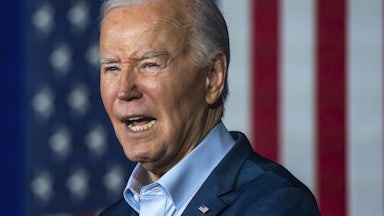On Monday morning, the self-canceled former New York Times editor Bari Weiss tweeted: “We got sick of complaining about how broken higher education is. So we decided to do something about it.” Attached was a link to a piece Weiss had published on her Substack by former St. John’s College president Pano Kanelos announcing the proto-formation of the innocuously named University of Austin—a new, as-yet-unaccredited, and largely half-baked “college” intended as a rebuke to America’s existing system of higher education, where wokeness runs amok and students throw professors who use the wrong pronouns into gulags. (It may or may not have been inspired by a fictional university from the Tom Green vehicle, Road Trip.)
In theory, it would be wonderful if Weiss and her compatriots truly were fed up with all the whining, seeing as there would be far fewer metric tons of it. Instead, the University of Austin appears to be a college in which complaining about not just higher education but politics, culture, and, well, anything else vaguely related to social justice is the primary obsession. (Its secondary obsession is separating wealthy gulls from their money.) This is a school that, despite being located in Austin, Texas, will not have a football team but may very well have a student body consisting entirely of the most obnoxious kids from the nation’s most reactionary high school debate teams, all majoring in “just asking questions.”
The plans that have been laid out so far are sketchy and unclear. Several high-profile anti-woke writers—Weiss, Andrew Sullivan, Caitlin Flanagan, to name a few—are attached in vague ways to this project. Few of the listed names are professors, let alone people who have taught a class. In general, it has more in common with Masterclass, the fake online “school” where you can pay a few hundred dollars to have Carlos Santana teach you how to noodle an electric guitar into submission, than with any actual university.
The vagueness is the point: The University of Austin is pitching itself as a new system of higher education with a “commitment to free inquiry” and a “new financial model” that is never exactly articulated. At this point, it seems largely to be a continuation of the current iteration of the intellectual dark web, in which millions of dollars are poured into new think tanks, newsletters, and now colleges, in the name of building counter-institutions to those that have been corrupted by the plague of wokeism. In practice, however, this isn’t so much the promise of some new wave of Brookings Institutions or Liberty Universities but, rather, an elaborate and lucrative hustle.
Kanelos’s post at least attempts to make the case for a new, unwoke university: There is too much self-censorship on college campuses, he claims. Conservative students are shunned, while right-wing professors are driven out by pitchfork-wielding mobs. There were other statistics marshaled that spoke to more academic concerns—40 percent of college students do not finish college, for instance—but the University of Austin does not seem to have a plan for how to effect change. It does, however, have a plan to launch itself as a college where no speaker will ever be disinvited.
The University of Austin hopes to launch a master’s program in the near future, with an undergraduate college opening by 2024. In the meantime, there will be a “Forbidden Courses” summer program, which will provide “a spirited discussion about the most provocative questions that often lead to censorship or self-censorship in many universities.” What this entails in practice is anybody’s guess, though I’m sure the ensuing conversation will be free of bigotry, stereotyping, and offensive remarks. Maybe they’ll just read the Tintin and Dr. Seuss books they don’t publish anymore.
The university is being backed in part by the Cicero Institute, a libertarian think tank funded by Palantir co-founder Joe Lonsdale. (It would not be so surprising if Lonsdale’s buddy Peter Thiel endowed a chair, if not more.) Despite Lonsdale’s deep pockets, the website largely consists of a plea for money from any wealthy donors who might also like to stand athwart history yelling stop. For the low sum of $3 million, you can have a chair for a faculty member named after you; for $100 million, you can live forever (or at least until the university collapses amid infighting six years from now) by having an undergraduate college in your name. There is, at this point, no campus, though the website does helpfully note that the university is hoping to raise between $25 million and $100 million for land in Austin. And why Austin, you ask? The university’s website notes, “If it’s good enough for Elon Musk and Joe Rogan, it’s good enough for us.” That statement alone tells you everything you need to know about the student body the university is hoping to attract.
Much is made about the University of Austin’s insistence on “free inquiry” and its dogmatic commitment to free speech. But despite the wider critique of higher education’s obsession with identity politics, the University of Austin appears to be more invested in these questions than any college or university I can think of—even Oberlin. Two of its three founding faculty members, Ayaan Hirsi Ali and Kathleen Stock, have been criticized for Islamophobia and transphobia, respectively. Far from being an institution freed from the concerns of identity politics, it’s far more likely that the University of Austin will relentlessly burrow into issues of identity—the nail these hammer-wielders already see everywhere. This, coupled with the nod to Musk and Rogan, suggests that, rather than free inquiry and debate, what you will get at the University of Austin is a student body intent on nothing more than owning the libs—and making bombastic and likely offensive claims about issues of race and gender. It’s Liberty University but for the unwoke—except, of course, so is Liberty University. Perhaps this is a more apt description: The University of Austin is a Bible college without the Bibles.
There are some interesting hypotheticals to ponder: Would the University of Austin invite, for instance, a speaker in favor of Palestinian statehood? Someone in favor of trans rights? It might, but it strikes as beside the point because no effort is being made to create a university that is particularly intellectually diverse or rigorous. Anyway, what would be the point of selling people on a safe space just to sully it with dangers? It would gravely undermine this crew’s new lucrative grift.
Ultimately, this is the obvious problem with the University of Austin. For all the big talk about censorship and free inquiry, the entire project is thin soup, intellectually speaking. The professors may be up in arms about having their opinions “censored” on issues of race and gender, but just because you create a space where people can pay you for the privilege of speaking freely about subjects that they can already subscribe to a slew of Substacks on doesn’t make it a college. Still, perhaps it was inevitable that the people who have become famous for complaining about higher education would invent an institute of higher education where they could continue to complain about it.










